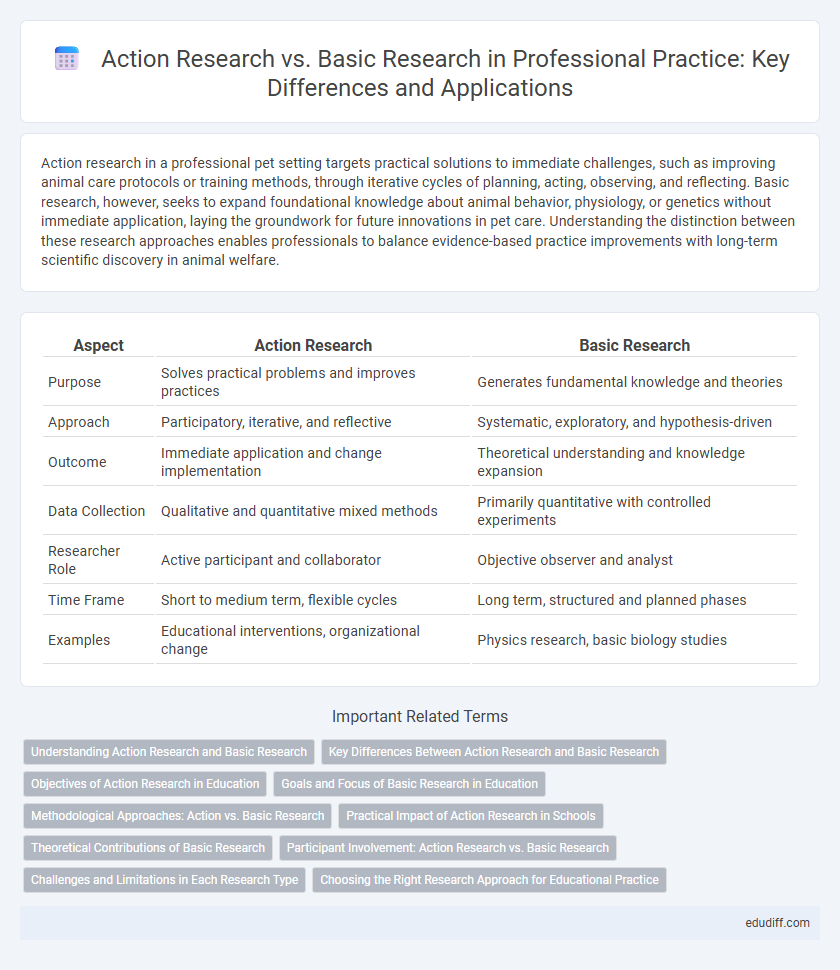Action research in a professional pet setting targets practical solutions to immediate challenges, such as improving animal care protocols or training methods, through iterative cycles of planning, acting, observing, and reflecting. Basic research, however, seeks to expand foundational knowledge about animal behavior, physiology, or genetics without immediate application, laying the groundwork for future innovations in pet care. Understanding the distinction between these research approaches enables professionals to balance evidence-based practice improvements with long-term scientific discovery in animal welfare.
Table of Comparison
| Aspect | Action Research | Basic Research |
|---|---|---|
| Purpose | Solves practical problems and improves practices | Generates fundamental knowledge and theories |
| Approach | Participatory, iterative, and reflective | Systematic, exploratory, and hypothesis-driven |
| Outcome | Immediate application and change implementation | Theoretical understanding and knowledge expansion |
| Data Collection | Qualitative and quantitative mixed methods | Primarily quantitative with controlled experiments |
| Researcher Role | Active participant and collaborator | Objective observer and analyst |
| Time Frame | Short to medium term, flexible cycles | Long term, structured and planned phases |
| Examples | Educational interventions, organizational change | Physics research, basic biology studies |
Understanding Action Research and Basic Research
Action research involves systematic inquiry conducted by practitioners to solve immediate problems and improve practices within specific contexts, emphasizing iterative cycles of planning, acting, observing, and reflecting. Basic research, also known as fundamental or pure research, seeks to expand theoretical knowledge without direct application, focusing on understanding underlying principles and phenomena. Both approaches contribute to scholarly knowledge but differ in purpose, with action research prioritizing practical impact and basic research emphasizing theory development.
Key Differences Between Action Research and Basic Research
Action research focuses on solving practical problems through iterative cycles of planning, acting, observing, and reflecting, directly involving participants and stakeholders in the process. Basic research aims to generate new theoretical knowledge and understand fundamental principles without immediate application, often conducted in controlled environments. Key differences include their objectives, methodologies, and the involvement of researchers with the subject matter; action research is participatory and context-specific, while basic research is more abstract and generalizable.
Objectives of Action Research in Education
Action research in education aims to improve teaching strategies, enhance student learning outcomes, and address specific classroom challenges through iterative cycles of planning, acting, observing, and reflecting. It focuses on practical problem-solving and immediate application, contrasting with basic research that seeks to generate generalizable knowledge without direct intervention. The primary objective of action research is fostering educator collaboration and continuous improvement in educational practices.
Goals and Focus of Basic Research in Education
Basic research in education aims to develop foundational knowledge and theoretical understanding of learning processes, cognitive development, and educational systems without immediate practical application. Its focus lies in exploring educational phenomena, identifying underlying principles, and generating hypotheses that can inform future applied research. Unlike action research, which targets specific classroom or institutional improvements, basic research prioritizes broad knowledge advancement and long-term educational theory enhancement.
Methodological Approaches: Action vs. Basic Research
Action research employs iterative cycles of planning, acting, observing, and reflecting to address practical problems within specific contexts, emphasizing collaboration between researchers and participants. Basic research prioritizes hypothesis-driven experimentation and systematic data collection to generate generalizable knowledge without immediate application goals. Methodologically, action research is qualitative and context-specific, while basic research often applies quantitative techniques to test theories under controlled conditions.
Practical Impact of Action Research in Schools
Action research in schools directly addresses classroom challenges by enabling teachers to implement and evaluate strategies in real-time, leading to immediate improvements in student outcomes and teaching methods. Unlike basic research, which seeks to generate theoretical knowledge without immediate application, action research emphasizes practical problem-solving tailored to specific educational settings. This method fosters collaboration among educators, promotes reflective practice, and drives continuous school improvement through evidence-based interventions.
Theoretical Contributions of Basic Research
Basic research primarily contributes to theoretical advancements by generating new knowledge and fundamental principles that deepen understanding across scientific disciplines. It establishes foundational frameworks and models that inform subsequent applied research and practical innovations. Unlike action research, which focuses on solving specific practical problems, basic research enriches the theoretical landscape essential for long-term scientific progress.
Participant Involvement: Action Research vs. Basic Research
Action research actively involves participants as co-researchers, fostering collaboration and immediate application of findings within the group or organization. Basic research typically maintains a distance from participants, focusing on generating theoretical knowledge without direct collaboration or immediate implementation. This distinction impacts the research design, data collection methods, and relevance of outcomes to practical settings.
Challenges and Limitations in Each Research Type
Action research faces challenges like limited generalizability and researcher bias due to its context-specific nature and close collaboration with participants. Basic research encounters limitations including slower practical application of findings and difficulties in controlling complex variables in natural settings. Both research types demand rigorous methodological strategies to address these inherent challenges and ensure validity.
Choosing the Right Research Approach for Educational Practice
Action research emphasizes practical problem-solving and continuous improvement within educational settings, enabling educators to implement and evaluate changes in real-time. Basic research aims to expand theoretical understanding and generate generalizable knowledge without immediate application, focusing on fundamental principles. Selecting the right research approach depends on whether the goal is to directly enhance educational practice through iterative cycles or contribute to broader scientific knowledge.
Action research vs Basic research Infographic

 edudiff.com
edudiff.com